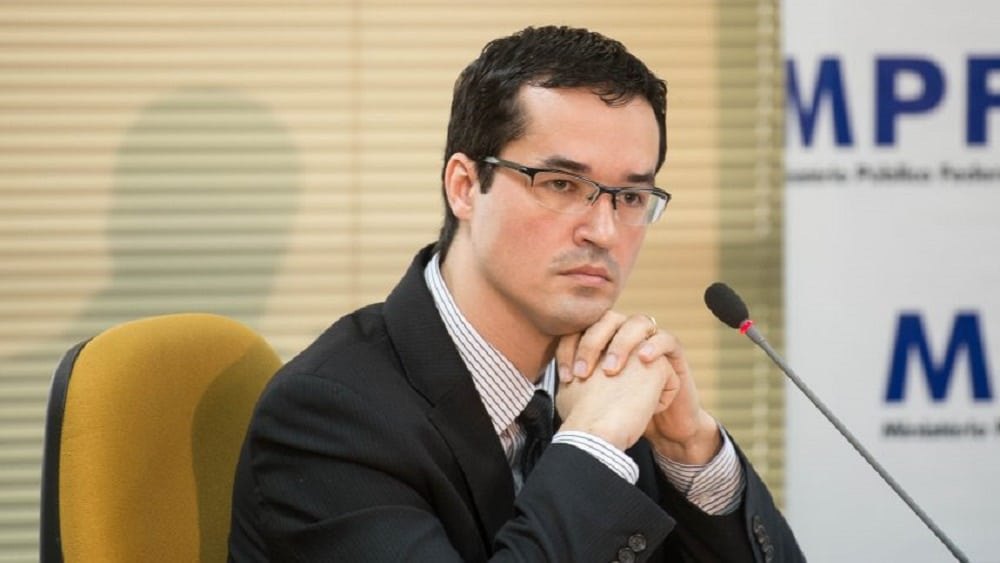By Tatiana Azevedo
The jurist Ives Gandra Martins argued on Tuesday (30) that the House of Representatives should not cancel the mandate of Congressman Deltan Dallagnol (Podemos-PR) until the Supreme Court analyzes the case.
The statement was made during a Financial Oversight and Control Commission hearing.
For him, the decision of the Superior Electoral Court (TSE) to impeach Dallagnol invades the Legislative Branch’s competence.

Besides him, the jurists Modesto Carvalhosa, Horácio Lopes, Leandro Souza, Dallagnol’s lawyer, and Joaquim Cabral da Costa Neto, member of the Electoral Attorney General’s Office, participated in the debate about the regularity of the electoral decisions and the possibility that they violate the current legislation about ineligibility.
The discussion occurred at the request of Congressman Kim Kataguiri (União-SP).
According to him, it is important to show society that great names in law considered that the interpretation of the Electoral Justice in the Dallagnol case created a new hypothesis not provided for in the legislation.
Gandra also pointed out that the Federal Constitution clearly states that the Three Powers are “independent and harmonious”.
In the jurist’s view, the recent decision of the TSE to revoke the mandate of a congressman for non-compliance with the Ficha Limpa (Clean Record) Law without there having been a Disciplinary Administrative Proceeding against him demonstrates that it invaded the competence of the Legislative Branch.
For Gandra, the conviction of Dallagnol occurred based on a new hypothesis of punishment, which does not exist in Brazilian law, and therefore the Legislature should not accept it.
“This new hypothesis invaded the competence of the Legislative Power; it is up to [it] to watch over its competence; it cannot accept [the cassation],” he added.
The jurist also pointed out that the law should always be interpreted in favor of the accused, which did not occur in Dallagnol’s case.
The opinion of Ives Gandra was shared by another jurist Modesto Carvalhosa.
He said that the law cannot be used to persecute people or institutions.
Carvalhosa said he was surprised that the Regional Electoral Court of Paraná, the state that elected Dallagnol, had not spoken earlier about the hypothesis that the former coordinator of the Lava Jato task force had asked for resignation from office to avoid possible Administrative Disciplinary Proceedings, which would make him ineligible.
“It is not up to the judge to presume the intention of a prosecutor when resigning to run for office,” he said. Carvalhosa added that “the TSE has destroyed the principle of presumption of innocence by decreeing a new rule of ineligibility.”
He suggested that the House prepare a Legislative Decree to clarify the attributions of the Electoral Justice and show that it does not accept what he classified as a “legal aberration”.
Deltan Dallagnol’s lawyer, Leandro Souza Rosa, reaffirmed that the decision of the Superior Electoral Court (TSE) on the annulment of the deputy is very serious, not only because it curtails the will of the voters of Paraná but also because it goes against the understanding of the Electoral Court itself.
“Nobody said at any moment that there was a fraud; now, at this moment, it is peculiar that, after exhausting the possibilities of defense, the TSE has taken the opportunity to look at the merit of the processes from afar, to extract virtual projection from there to say that there was a fraud,” he added.
DALLAGNOL DELIVERS DEFENSE TO THE HOUSE
Deltan Dallagnol attended the Plenary of the Financial Oversight and Control Commission hearing and once again said he was persecuted for fighting corruption in Brazil.
He presented on Tuesday to the Internal Procedures of the Chamber his defense, in writing, after being notified last week, via the Official Gazette of the Union, of the decision of the Electoral Court.
In 17 pages, the defense alleged that there was a misinterpretation of the law “By understanding that the request for exoneration before the establishment of the PAD would be, in itself, a fraud against the law, the TSE inaugurated a kind of combat against the ‘fraud against the law’.
The objective parameter established by the National Congress to assess fraud against the law was subjectivized by the Judiciary, which did so without any institutional support.
The fight against fraud against the law was squared but ad hoc and without any basis in precedents.
The defense also asks the House to wait for the STF’s decision before revoking the congressman’s mandate.
After receiving the defense, the Chamber’s Internal Procedures Office will prepare the case, which will be forwarded to the Chamber’s Executive Board. Until the House of Representatives final decision, Dallagnol will continue to serve as a congressman.
TESTIMONY TO THE FEDERAL POLICE
Dallagnol said the Federal Police notified him without being told in the summons about which process, in which condition, and disrespecting his prerogatives as a parliamentarian to set a time and date for the statement.
“If I had embezzled millions, I would be free and have a mandate, but since I acted against the system, a police persecution begins,” lamented Dallagnol.
Once again, the deputy called on society to express their dissatisfaction. Several demonstrations are scheduled to support the congressman on June 4.
With information from Gazeta do Povo
News Brazil, English news Brazil, Brazilian politics

